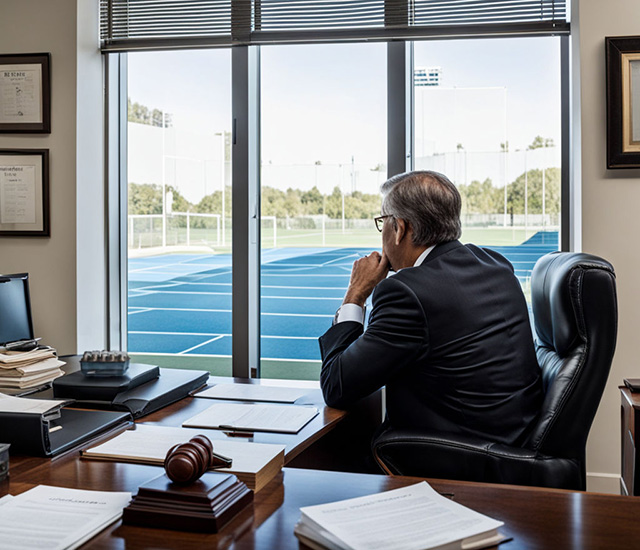Becoming a sports lawyer offers an exciting opportunity to merge a passion for sports with a legal career, addressing the complex and diverse legal needs of the sports industry.
 sports lawyer (AI)
sports lawyer (AI)What does a sports lawyer do?
The field of sports law covers a range of work, including contract negotiation, intellectual property protection, labor law, dispute resolution, and regulatory compliance. Sports lawyers engage in activities like drafting and negotiating contracts for athletes, teams, and sponsors, ensuring fair terms and legal protections. They also handle intellectual property issues, safeguarding trademarks and copyrights related to sports brands and media.
Labor and employment law is another critical area, with sports lawyers often involved in collective bargaining and resolving disputes between players and leagues. Effective dispute resolution, whether through litigation or arbitration, is a key component of their work, as is advising clients on compliance with sports regulations and managing legal risks.
What qualities make a good sports lawyer?
To excel in this field, sports lawyers need a strong foundation in various legal disciplines and exceptional communication skills to convey complex legal concepts clearly and persuasively. Combined with a passion for sports enhances their understanding of industry-specific issues and strengthens their ability to relate to clients.
Negotiation skills are crucial for securing favorable terms in contracts and resolving disputes, while analytical and problem-solving abilities are essential for navigating the intricate legal landscape of sports.
Ethical integrity is paramount, as sports lawyers must uphold the law and represent their clients with professionalism.
How to become a sports lawyer
The pathway to becoming a sports lawyer typically involves obtaining a Juris Doctor (JD) degree from an accredited law school, where specializing in sports law through relevant courses and practical experiences is beneficial.
Passing the bar exam and gaining admission to practice law in your state is a prerequisite, and ongoing professional development is important for staying current with the latest trends in sports law.
Gaining practical experience through internships with law firms or sports organizations can also provide valuable insights and build a strong resume.
Getting ahead in Sports Law
Demonstrating a genuine passion for sports, coupled with a deep understanding of the industry, can set you apart as a candidate. But being a sports fan is not enough.
Building a career in sports law requires a combination of qualifications and strategic efforts. Essential qualifications include a JD degree, bar admission, and practical experience in sports law. Continuing legal education and specialized certifications can further enhance one's expertise and competitiveness in the field. Networking within the sports industry is vital for uncovering job opportunities and building professional relationships.
Attending sports law conferences, joining professional associations, and connecting with industry professionals can help build a network that facilitates career advancement. Staying informed about developments in sports law through industry publications and educational programs is crucial for maintaining proficiency.
By developing niche expertise, gaining practical experience, and showcasing your enthusiasm for sports, you can position yourself for a successful and rewarding career as a sports lawyer.
Related Pages
- How to Study Sports Law
- Legal Steps Sports Teams Should Follow Before Launching Merchandise
- Sports Marketing — including the job as a Sports Agent.
- Sport Businesses — How to start a business in the fitness industry.
- Careers in Sports


 Current Events
Current Events